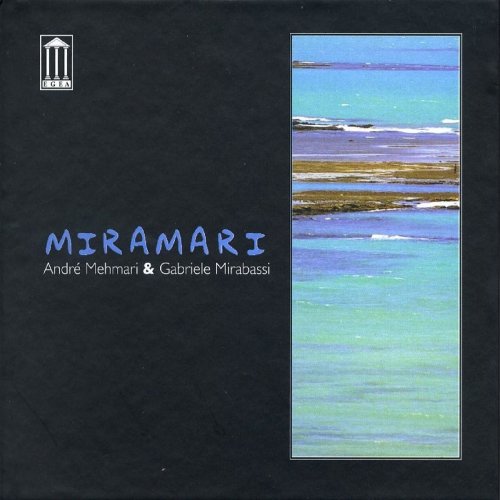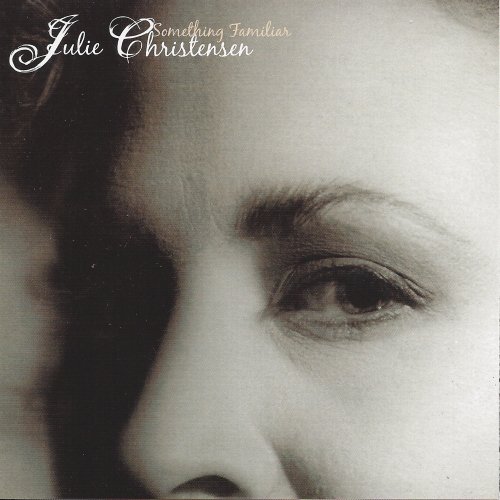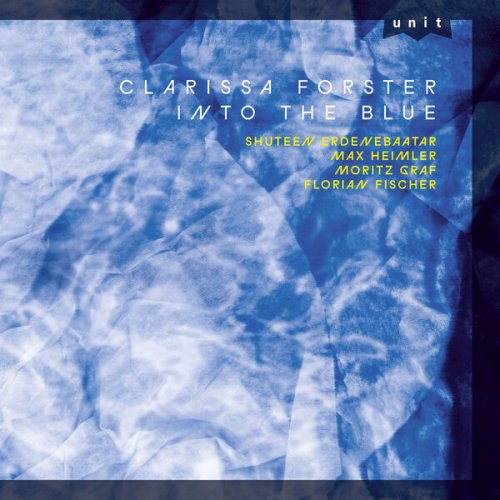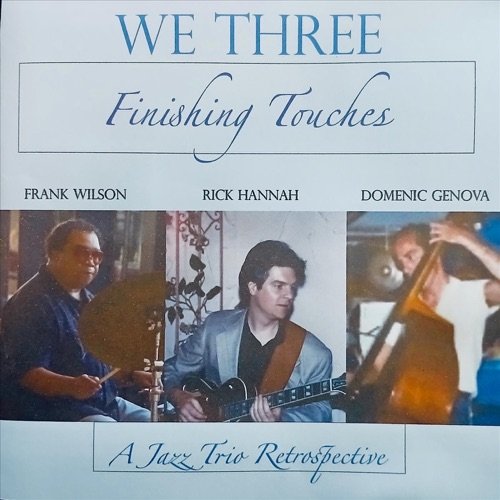André Mehmari & Gabriele Mirabassi - Miramari (2009/2019)

Artist: André Mehmari & Gabriele Mirabassi
Title: Miramari
Year Of Release: 2019
Label: Egea Srl
Genre: Jazz
Quality: FLAC (tracks)
Total Time: 45:39 min
Total Size: 209 MB
WebSite: Album Preview
Tracklist:Title: Miramari
Year Of Release: 2019
Label: Egea Srl
Genre: Jazz
Quality: FLAC (tracks)
Total Time: 45:39 min
Total Size: 209 MB
WebSite: Album Preview
01. Que falta faz tua ternura
02. Frêvo - paráfrase
03. Rasgando seda
04. Vaidoso
05. Cançao desnecessaria
06. Primeiro choro de Lucas
07. Chove na minha valsa
08. Choro da Continua Amizade
09. Disarmati
10. Mirabilis Mirabassi
11. O Espelho
12. Subindo a Cantareira
13. Rondoletto per i bambini
Miramari is a musical whirlpool that bubbles with rhythmic ripples and swirls in a manner conveying a gentle disturbance that gathers in intensity at times. It is in this mysteriously liquid realm that Brazilian pianist Andre Mehmari and Italian clarinetist Gabriel Mirabassi concoct their sublime music, mixing disparate metaphors with idiomatic phrases and images. Somehow, by a supreme plan unbeknownst to any but these two alchemists, a magical moving sonic picture forms. It beckons the listener to also watch as it musically evolves with the soul of the Northeast of Brazil, then the Cariocas and the Paulistas, then suddenly a Villa-Lobos flight of fancy, and finally swooping over Europe's musical stage, conjuring up Gabriel Fauré and Erik Satie.
Andre Mehmari has long been casting a spell on audiences wherever he has played. His firm hands have been blessed by long, sinewy, fingers that are surprisingly gentle when they touch the piano keys. Despite his preoccupation with the long and celebrated line of pianists of Brazil, he emerges out of tradition as his own man. His solos leap and bound with spiritual fervor in a linear manner, as in "Um Anjo Nasce," to start with, before turning tantalizingly circular. Brevity is his forte and he does not waste notes, preferring instead to contribute expression—in overtones and dynamics—to overall sound.
Gabriele Mirabassi is a master of the clarinet, a difficult woodwind instrument. He is tremendously expressive, making his instrument sing like an operatic aria. He is the equal of anyone on this instrument, from Artie Shaw to Maurice André. He can play with deep intonation and classic phrasing so sweetly that he often produces magical choral voices from his softly fibrillating reed.
On Miramari, these two musicians have a whale of a time moving across landscapes awash with music, like rushing down a mountainside in Amazonian splendor. They thrive in their frolicking, yet they also bow to the art of the rondo ("Rondoletto Per a Bambini") and ponder in the somber beauty of the nocturne ("Perugia Notturna"). They dance around each other like petal-whorls in "Chove na Minha Valsa" and "Uma Vala em Forma de Ávore." They weep, wide-eyed and ecstatic, in the environs of "Choro da Continua Amizade" and dance interminably in the eternal spring of "Brilha o Carnaval."
More often than not, the duo meander in the invention of their own design, playing melodious and rhythmic tricks on pulse and on time by darting in and out of subtly changing tonal colors and hues. The record is replete with several examples of this, but "Disarmati" and "Mirabilis Mirabassi" may be sufficient to drive the heart to vivid palpitations.
The excellence on this record does not come from Mehmari and Mirabassi alone; credit also goes to percussionist Ricardo Mosca and bassist Zé Alexandre Carvalho, who plays with stirring pizzicato and a certain gravitas in pedal point. Here, then, is a record of great accomplishment with stirring content performed by musicians of otherworldly talent.
Andre Mehmari has long been casting a spell on audiences wherever he has played. His firm hands have been blessed by long, sinewy, fingers that are surprisingly gentle when they touch the piano keys. Despite his preoccupation with the long and celebrated line of pianists of Brazil, he emerges out of tradition as his own man. His solos leap and bound with spiritual fervor in a linear manner, as in "Um Anjo Nasce," to start with, before turning tantalizingly circular. Brevity is his forte and he does not waste notes, preferring instead to contribute expression—in overtones and dynamics—to overall sound.
Gabriele Mirabassi is a master of the clarinet, a difficult woodwind instrument. He is tremendously expressive, making his instrument sing like an operatic aria. He is the equal of anyone on this instrument, from Artie Shaw to Maurice André. He can play with deep intonation and classic phrasing so sweetly that he often produces magical choral voices from his softly fibrillating reed.
On Miramari, these two musicians have a whale of a time moving across landscapes awash with music, like rushing down a mountainside in Amazonian splendor. They thrive in their frolicking, yet they also bow to the art of the rondo ("Rondoletto Per a Bambini") and ponder in the somber beauty of the nocturne ("Perugia Notturna"). They dance around each other like petal-whorls in "Chove na Minha Valsa" and "Uma Vala em Forma de Ávore." They weep, wide-eyed and ecstatic, in the environs of "Choro da Continua Amizade" and dance interminably in the eternal spring of "Brilha o Carnaval."
More often than not, the duo meander in the invention of their own design, playing melodious and rhythmic tricks on pulse and on time by darting in and out of subtly changing tonal colors and hues. The record is replete with several examples of this, but "Disarmati" and "Mirabilis Mirabassi" may be sufficient to drive the heart to vivid palpitations.
The excellence on this record does not come from Mehmari and Mirabassi alone; credit also goes to percussionist Ricardo Mosca and bassist Zé Alexandre Carvalho, who plays with stirring pizzicato and a certain gravitas in pedal point. Here, then, is a record of great accomplishment with stirring content performed by musicians of otherworldly talent.
![Ying-Da Chen - Animal Triste (2026) [Hi-Res] Ying-Da Chen - Animal Triste (2026) [Hi-Res]](https://www.dibpic.com/uploads/posts/2026-03/1772673724_eioi3gteovgg7_600.jpg)
![Louis Billette - Lux II (2026) [Hi-Res] Louis Billette - Lux II (2026) [Hi-Res]](https://img.israbox.com/img/2026-03/02/mruoenouefcb2wvik5oje90ha.jpg)



![Paul Giess - Phronesis (2026) [Hi-Res] Paul Giess - Phronesis (2026) [Hi-Res]](https://img.israbox.com/img/2026-03/03/jnvs3x8azp7r5exf5vijztdkf.jpg)

![Mosaic - Unfolding Tiles (2026) [Hi-Res] Mosaic - Unfolding Tiles (2026) [Hi-Res]](https://img.israbox.com/img/2026-03/05/9gt7lxt43bibxrmfl6nca8miy.jpg)
![Ben Williams - No Words. (Between Church & State instrumentals)(2026) [Hi-Res] Ben Williams - No Words. (Between Church & State instrumentals)(2026) [Hi-Res]](https://img.israbox.com/img/2026-03/04/cq7j2c1y36lc3fseqjfx3r2qi.jpg)